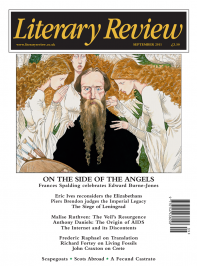Paul Bailey
Romanian Holiday
The Last Hundred Days
By Patrick McGuinness
Seren 377pp £8.99
Patrick McGuinness has written an unusual, and unusually interesting, first novel. Its title refers to the last hundred days of Nicolae Ceauşescu’s malign regime in Romania – the sole country in the Eastern bloc that seemed indifferent to, and unaffected by, the atmosphere that preceded the collapse of the Berlin Wall. The revolution that took place at Christmas 1989 surprised everybody, not least the oppressed Romanians themselves. As far as they were concerned, the Conducător and his absurdly wicked spouse Elena were there to stay, regardless of what was happening in Hungary and Poland. McGuinness is alert to the everyday climate in Bucharest in the 1980s, when fear and boredom were compounded in a way that still shocks those, like me, who witnessed it. Trusting other people, even one’s closest relatives and friends, was a risky business. Bugging devices were everywhere, recording coughs and farts along with information that would have been considered trivial in the ‘decadent’ West. Imagine a bedroom farce, by the likes of Feydeau, in which the wardrobe door is yanked open to reveal a man in a long leather coat – the official uniform of the Securitate, the secret police – instead of the usual besotted lover in a state of undress, and you will have an idea of the ludicrous state of affairs behind the prevailing terror.
The Last Hundred Days gives an accurate picture of the Bucharest that was being destroyed to accommodate the monumental piece of architectural kitsch that would stand as a lasting reminder of Ceauşescu’s peculiar brand of socialism. Apartment buildings, churches, shops and a Turkish mosque that had been a

Sign Up to our newsletter
Receive free articles, highlights from the archive, news, details of prizes, and much more.@Lit_Review
Follow Literary Review on Twitter
Twitter Feed
Alfred, Lord Tennyson is practically a byword for old-fashioned Victorian grandeur, rarely pictured without a cravat and a serious beard.
Seamus Perry tries to picture him as a younger man.
Seamus Perry - Before the Beard
Seamus Perry: Before the Beard - The Boundless Deep: Young Tennyson, Science, and the Crisis of Belief by Richard Holmes
literaryreview.co.uk
Novelist Muriel Spark had a tongue that could produce both sugar and poison. It’s no surprise, then, that her letters make for a brilliant read.
@claire_harman considers some of the most entertaining.
Claire Harman - Fighting Words
Claire Harman: Fighting Words - The Letters of Muriel Spark, Volume 1: 1944-1963 by Dan Gunn
literaryreview.co.uk
Of all the articles I’ve published in recent years, this is *by far* my favourite.
✍️ On childhood, memory, and the sea - for @Lit_Review :
https://literaryreview.co.uk/flotsam-and-jetsam